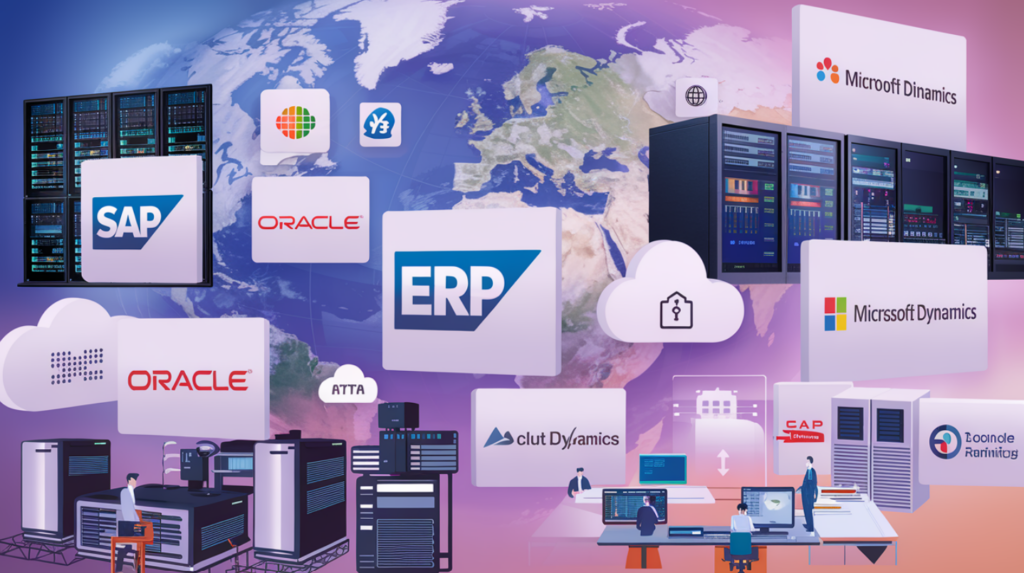Financial Reporting Across Multiple ERP Systems for Efficiency
Multi-entity businesses often find themselves grappling with the challenge of consolidating financial reporting across multiple ERP systems. This process, known as multi-ERP financial reporting, is crucial for achieving financial transparency, streamlined reporting, and efficient financial consolidation. As organizations grow and expand, they frequently acquire or develop multiple enterprise resource planning systems to manage different aspects of their operations. However, this diversity can lead to data silos, inconsistencies, and inefficiencies in financial reporting, especially when systems struggle with non-standardized reports. This article explores the challenges, strategies, and benefits of consolidating financial reporting across multiple ERP systems, with a focus on enhancing efficiency and accuracy in reporting entities.
What are the Challenges of Using Multiple ERP Systems?
Understanding the Complexity of Different ERP Systems
Multi-entity businesses often face significant hurdles when dealing with multiple ERPs, impacting their financial reporting. Each system may have its own unique chart of accounts, data structures, and reporting formats, making it challenging to achieve a unified view of business data. This complexity can lead to inconsistencies in financial reporting and hinder the ability to make informed decisions based on accurate, real-time information.
Impact on Financial Reporting and Analysis
The use of multiple ERP systems can have a profound impact on financial reporting and analysis, particularly when systems struggle with non-standardized reports. Without proper integration, organizations may struggle with:
- Inconsistent naming conventions
- Difficulties in intercompany reconciliation
- Challenges in currency conversion can complicate the consolidation of financial data across systems.
- Delays in the financial close process can hinder compliance with statutory financial statements and other reporting standards.
- Increased risk of errors due to manual data entry
These issues can significantly impede the efficiency of financial planning and analysis (FP&A) processes and make it difficult to generate timely, accurate financial statements, leading to discrepancies in financial reporting.
Common Issues with ERP Data Integration
Data integration is a critical challenge when consolidating financial reporting across multiple enterprise resource planning systems. Some common issues include:
- Data quality control problems
- Difficulties in data mapping between disparate systems can hinder effective financial reporting within the ERP system.
- Challenges in maintaining data integrity arise when compiling data across many systems, especially ERP systems.
- Complexities in managing master data across multiple platforms
- Inconsistencies in data formats and structures
Addressing these issues is essential for achieving effective multi-ERP financial reporting and ensuring the accuracy of consolidated financial statements within the ERP system.
"Streamlining multi-ERP financial reporting is the key to unlocking efficiency in complex corporate environments. By consolidating data from disparate systems, businesses can transform their reporting process from a time-consuming challenge into a strategic advantage."
Anon
How Can Companies Consolidate Financial Reporting Effectively?
Strategies for ERP Consolidation
To overcome the challenges of multi-ERP financial reporting, companies can employ several strategies, including integrating robust reporting tools.
- Implement a centralized databaseCreate a single source of truth for financial data by consolidating information from various ERP systems into a centralized database for improved financial analysis and better insight into the company’s financial health.
- Standardize processesDevelop standardized processes for data collection, validation, and reporting across all entities and ERP systems tailored to specific business requirements.
- Utilize data warehousing: Implement a data warehouse to store and organize financial data from multiple sources, facilitating easier analysis and reporting.
- Adopt Extract, Transform, Load (ETL) processes: Use ETL tools to extract data from different ERP systems, transform it into a consistent format, and load it into a centralized repository.
- Implement Master Data Management (MDM) to ensure consistent reporting across multiple ERP systems.: Establish a robust MDM strategy to ensure consistency in key financial data elements across all systems.
Best Practices for Financial Data Management
To ensure effective multi-ERP financial reporting, organizations should adhere to the following best practices for meeting reporting requirements:
- Establish consistent naming conventions: Develop and enforce standardized naming conventions for accounts, entities, and other financial elements across all ERP systems.
- Implement data validation processes within the ERP system to enhance the accuracy of financial reporting.Set up automated data validation checks within the ERP system to identify and rectify discrepancies before they impact financial reports, ensuring accurate and reliable financial outcomes.
- Maintain audit trails for financial reporting in ERP systems.: Ensure that all financial data transformations and consolidations within the enterprise resource planning (ERP) system are traceable through comprehensive audit trails to maintain consistent reporting.
- Regularly reconcile intercompany transactions: Implement automated processes for reconciling intercompany transactions to maintain accuracy in consolidated financial statements.
- Enforce data security measures to protect sensitive financial data within ERP systems.Implement role-based access controls and other security measures to protect sensitive financial information within the ERP financial framework, ensuring better decision-making and financial outcomes.
Tools and Technologies for Consolidating Financial Statements
Several tools and technologies can facilitate the consolidation of financial statements across multiple ERP systems, making it easier to monitor the company’s financial health.
- Financial consolidation software enhances the financial reporting processes within an organization.Specialized software designed to automate the consolidation process, handle currency conversions, and generate standardized reporting for consolidated financial statements.
- Business intelligence (BI) tools: BI platforms that can integrate data from multiple sources and provide advanced analytics and reporting capabilities.
- Cloud-based solutions provide a flexible environment for improved financial analysis and reporting.: Cloud platforms that offer centralized data storage and processing, enabling real-time updates and collaboration across entities.
- Intelligent ERP systems enhance financial analysis and forecasting capabilities.Next-generation ERP solutions that incorporate AI and machine learning to automate data integration and improve financial reporting processes and reporting accuracy.
What Are the Benefits of ERP Integration for Financial Reporting?
Improving Efficiency in Financial Processes
Consolidating financial reporting across multiple ERP systems can lead to significant improvements in efficiency:
- Reduced manual data entry: Automation of data collection and consolidation processes minimizes the need for manual intervention, reducing errors and saving time.
- Faster financial close: Streamlined processes and real-time data updates enable organizations to close their books more quickly and efficiently.
- Enhanced collaborationIntegrated systems help facilitate better communication and collaboration between different departments and entities, improving financial reporting processes.
- Improved productivity: By eliminating the need for context switching between different systems, finance teams can focus on more value-added activities.

Enhancing Accuracy in Financial Data
Multi-ERP financial reporting, when done correctly, can significantly enhance the accuracy of financial data:
- Reduced data discrepancies: Automated data integration and validation processes help identify and resolve inconsistencies across different ERP systems.
- Improved data integrity: Centralized data management ensures that all financial information is consistent and up-to-date across the organization.
- Enhanced complianceIntegrated systems make it easier to adhere to global accounting standards such as U.S. GAAP and IFRS, reducing the risk of regulatory penalties and ensuring the consolidation of financial data across systems.
Facilitating Real-Time Reporting Across Multiple ERP Systems
One of the key benefits of consolidating financial reporting is the ability to generate real-time reports:
- Up-to-date financial insights are critical for organizations operating within the ERP system to make informed decisions.: Decision-makers can access current financial information from across the organization at any time.
- Improved forecasting: Real-time data enables more accurate financial planning and analysis, supporting better strategic decision-making.
- Enhanced performance monitoring: Organizations can track key performance indicators (KPIs) across multiple entities in real-time, allowing for quicker responses to market changes.
How to Choose the Right ERP Solutions for Consolidation?
Criteria for Selecting ERP Software
When selecting ERP software for financial consolidation, organizations should consider the following criteria to ensure compliance with reporting standards:
- Scalability is essential for ERP systems tailored to meet the needs of diverse business operations.: The solution should be able to accommodate the organization’s growth and handle increasing volumes of financial data within a single ERP system.
- Integration capabilities: The ERP system should easily integrate with existing systems and support various data formats.
- Customization options in ERP systems help organizations tailor their solutions to meet specific financial reporting needs, especially when systems is a common occurrence.: Look for ERP systems that offer flexibility in customizing reports and workflows to meet specific business needs across multiple systems.
- Compliance support is essential for maintaining multiple ERP systems and ensuring adherence to relevant regulations.: Ensure the system can handle regulatory requirements and support both U.S. GAAP and IFRS reporting.
Evaluating Different ERP Systems for Financial Management
When evaluating ERP systems for financial management, consider the following factors:
- Multi-currency support is a key feature that many ERP systems might offer to facilitate global operations.The ability to handle financial transactions and reporting in multiple currencies is crucial for global organizations to meet international financial reporting standards.
- Automated consolidation features: Look for systems that offer automated processes for financial consolidation, including intercompany eliminations and currency conversions to enhance financial reporting capabilities.
- Drill-down capabilities: The ability to drill down from consolidated reports to individual transactions is essential for detailed analysis and auditing.
- Reporting flexibility is vital in ERP systems to accommodate customized financial reports.: Evaluate the system’s ability to generate various types of financial reports, including balance sheets, income statements, and cash flow statements.
Cost Considerations in ERP Integration
When considering the costs of ERP integration for financial consolidation, organizations should evaluate the benefits of using the same ERP across all departments.
- Implementation costs: Include expenses for software licenses, hardware upgrades, and professional services for implementation and training.
- Ongoing maintenance of ERP systems is a common necessity to ensure optimal performance.: Consider the costs of regular updates, support, and potential customizations.
- Return on Investment (ROI): Assess the potential ROI by considering factors such as improved efficiency, reduced errors, and better decision-making capabilities.
- Total Cost of Ownership (TCO) in an ERP system requires careful planning.Evaluate the long-term costs of owning and operating the integrated ERP system, including potential savings from retiring legacy systems and transitioning to one ERP solution across multiple systems.
What Role Does Financial Planning Play in ERP Consolidation?
Aligning Financial Goals with ERP Strategies
Effective financial planning is crucial when consolidating ERP systems for accurate reporting and financial reporting.
- Strategic alignment is vital for optimizing resource allocation across multiple ERPs.: Ensure that the ERP consolidation strategy aligns with the organization’s overall financial goals and objectives.
- Resource allocation must be carefully managed to comply with financial reporting requirements across multiple ERPs.: Plan for the necessary resources, including budget, personnel, and time, required for successful ERP integration.
- Risk assessment: Identify and mitigate potential risks associated with the consolidation process, such as data loss or system downtime.
Using Financial Data for Strategic Decision Making
Consolidated financial data from multiple ERP systems can provide valuable insights for strategic decision-making:
- Profitability analysis: Analyze consolidated data to identify the most profitable products, services, or business units across the organization.
- Investment decisions: Use comprehensive financial information to evaluate potential investments and acquisitions more accurately.
- Performance benchmarking: Compare financial performance across different entities and against industry standards to identify areas for improvement.
Forecasting Financial Performance with Integrated Data
Integrated financial data enables more accurate and comprehensive forecasting:
- Improved accuracy: Consolidated data from multiple ERP systems provides a more complete picture of the organization’s financial health, leading to more accurate forecasts and adherence to financial reporting standards.
- Scenario planning: Use integrated data to model various scenarios and their potential impact on the organization’s financial performance.
- Cash flow managementBetter visibility into cash flows across multiple enterprise resource planning systems enables more effective cash management and financial forecasting within the ERP system.

How Does Data Across Multiple ERP Systems Impact Financial Health?
Assessing Financial Performance Using Consolidated Data
Consolidated data from multiple ERP systems provides a holistic view of an organization’s financial health:
- Comprehensive performance metrics are vital for evaluating the effectiveness of ERP systems across various departments.: Generate key performance indicators (KPIs) that reflect the entire organization’s financial status.
- Improved financial transparencyGain a clearer understanding of the financial relationships between different entities and business units to enhance financial analysis and reporting by compiling data across multiple ERP systems.
- Enhanced audit readiness: Consolidated data and standardized processes make it easier to prepare for and undergo financial audits.
Mitigating Risks Associated with Multiple Systems
Consolidating financial reporting across multiple ERP systems can help mitigate various risks:
- Reduced data inconsistencies improve the accuracy of financial reporting in ERP systems.Integrated ERP systems minimize the risk of conflicting financial information across different entities, leading to more accurate and reliable financial reporting standards.
- Improved compliance with financial reporting processes in ERP systems enhances the company’s financial health.Standardized processes and consolidated reporting within the ERP system make it easier to comply with regulatory requirements and accounting standards.
- Enhanced data securityCentralized data management allows for more robust security measures and better control over sensitive financial information, which is crucial when maintaining multiple ERP systems.
Improving Financial Health Through Effective Reporting Processes
Efficient multi-ERP financial reporting can contribute to improved overall financial health:
- Faster decision-making is achieved when ERP systems enable real-time access to financial data.: Real-time access to consolidated financial data enables quicker and more informed decision-making.
- Cost savings: Streamlined processes and reduced manual effort lead to cost savings in financial operations.
- Improved stakeholder confidence can be achieved through transparent financial reporting standards.: Accurate and timely financial reporting enhances trust among investors, creditors, and other stakeholders.
Consolidating financial reporting across multiple ERP systems is a complex but essential process for multi-entity businesses seeking to improve efficiency and accuracy in their financial operations. By addressing the challenges, implementing effective strategies, and leveraging appropriate tools and technologies, organizations can achieve a unified view of their financial data, enhance decision-making capabilities, and ultimately improve their overall financial health. As businesses continue to grow and evolve, the ability to effectively manage multi-ERP financial reporting will become increasingly crucial for maintaining competitiveness and driving sustainable growth.
Your next steps...
💡Click here to ensure data residency compliance and reduce time spent on period-end reporting
🔋Click here if you wish to solve 25+ Spreadsheet reporting issues
🔆 Click here to improve the accuracy and usability of generated reports
💯 Click here to decrease risk by providing on-demand access to the transaction detail behind every reported balance
☎️ Book a free, no-obligation walkthrough with Mondial to see how we can help you in financial reporting and consolidations just like one of our successful clients.






